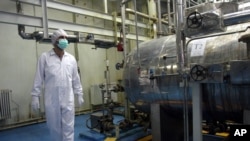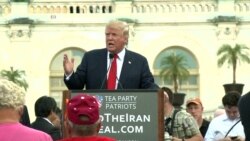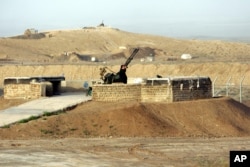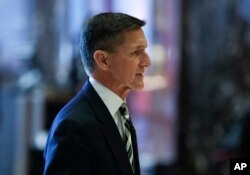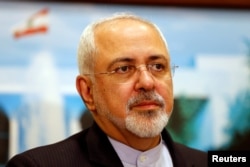Republicans and other long-time opponents of an international nuclear agreement with Iran have walked back calls to scrap the deal and are now urging the incoming Trump administration to stiffen it rather than unravel what President-elect Donald Trump once termed as "the worst deal ever negotiated."
With Iran and European allies imploring the new administration to honor the accord that restricted Iran's nuclear program in exchange for sanctions relief, fear is growing that a unilateral withdrawal from the deal would leave the U.S. internationally isolated and might even push Tehran to reinstate its suspected nuclear weapons program.
That fear is shared by the deal's critics.
The Foundation for the Defense of Democracies, a conservative think tank in Washington, was an early supporter of the "stop the Iran nuclear deal" campaign and pressed members of Congress last year to block it. While it remains critical of what it sees as a dangerous and flawed agreement, it now opposes rescinding it.
"There are risks of the U.S. withdrawing," said Orde Kittrie, a senior fellow at the foundation and a professor of law at Arizona State University. "If the U.S. withdraws from the deal, Iran would feel free to cast off the restrictions on its nuclear program. It would be very hard to reinstate the sanctions. U.S. allies would be very upset."
No legal reason
Legally, the new president will have the authority to simply walk away from the pact, legal scholars say. The deal was deliberately structured not as a treaty but as a non-binding international agreement, and the U.N. Security Council resolution that endorsed it does not require its members to abide by it.
"There would not be any direct international legal consequences if the U.S. were to change its view," said Edward Swaine, a law professor at George Washington University and a former counselor on international law at the U.S. State Department.
Another early critic of the deal was Eliot Cohen, a professor at the Johns Hopkins University and a former State Department official known for his hawkish foreign policy views. Cohen said he was not "in favor of the Iran deal," but he now opposes its abandonment.
"If the president wanted to [rescind the agreement], yes, the president can do that but a normal president would not do that just because of all the expectations of our allies..." he said Wednesday at a conference sponsored by the Middle East Institute, a nonpartisan Washington think tank.
Congressional opponents have walked back from calls to kill the deal altogether. After failing to block the agreement last year, Republican members of Congress are now pushing for tighter restrictions on Iran on top of renewing non-nuclear related sanctions dating back to the 1990s.
"I don't think there is going to be a push to throw this deal out the window," Kittrie said. "My sense is you're going to have a push from Congress to implement the deal vigorously and to basically push back against Iranian mischief in the region."
'Worst of backroom deals'
The agreement, signed by Iran and six major world powers, imposed severe curbs on Iran's nuclear program in exchange for lifting crippling international sanctions and releasing billions of dollars in frozen Iranian assets.
The Obama administration and other proponents of the deal argue it will restrict Iran's ability to build a nuclear bomb for the next 10 to 15 years.
President-elect Trump and other critics say the U.S. made too many concessions and received no guarantee that Iran will not pursue its nuclear ambitions or run roughshod in the Middle East.
The concern that Trump intends to "rip up" the deal dates back to comments he made last year on NBC's "Meet the Press." Though he called the deal "horrible" and said it could lead to a "nuclear holocaust," he equivocated when asked whether it would survive a Trump administration.
"It's very hard to say. We're ripping it up," he said.
Like other deals he's inherited, he said he'd "police that contract so tough that they don't have a chance."
Trump's national security appointees are among Iran's harshest critics in foreign policy circles and have taken a similar stance. Republican Congressman Mike Pompeo, named on Friday to head the Central Intelligence Agency, has called the agreement the "worst of backroom deals," and claimed that it raises the risk of allowing Iran to acquire nuclear weapons. Michael Flynn, a former head of the Defense Intelligence Agency who was appointed as Trump's National Security Adviser, has strongly come out against it.
Rather than abandoning an agreement that U.S. allies support and Iran is widely believed to be complying with, Kittrie said, the Trump administration will likely toughen its stance against Iran, demanding more intrusive inspections of the country's nuclear program and taking steps to rein in "Iranian mischief outside the nuclear program."
Iran's quandary
Iran has rejected calls to renegotiate the deal and its foreign minister Mohammad Javad Zarif, last week urged Trump to honor it, saying it's not a bilateral agreement "for one side to be able to scrap."
Ali Akbar Velayati, the top foreign policy adviser to Iran's supreme leader, Ali Khamenei, echoed Khamenei's tough stance: If the administration pulls out of the agreement, "Iran will set it afire," he said in comments cairrWednesday carried by Iran's official news agency.
A U.S. withdrawal from the agreement will present Iran with a conundrum. On the one hand, Iran can resume its nuclear enrichment program, arguing that the deal does not have the force of law with one of its signatories out.
On the other hand, Iran has reaped vast economic benefits from the lifting of international sanctions and may decide to stick with the agreement in order to expand its ties with Europe, Russia and China.
"The Iranians will have to decide whether the European markets are worth it or one could imagine Iran simply saying, 'The deal is off,' and we'll unwind all the way back to where we were five, six years ago," said Duncan Hollis, an international law professor at Temple University.




